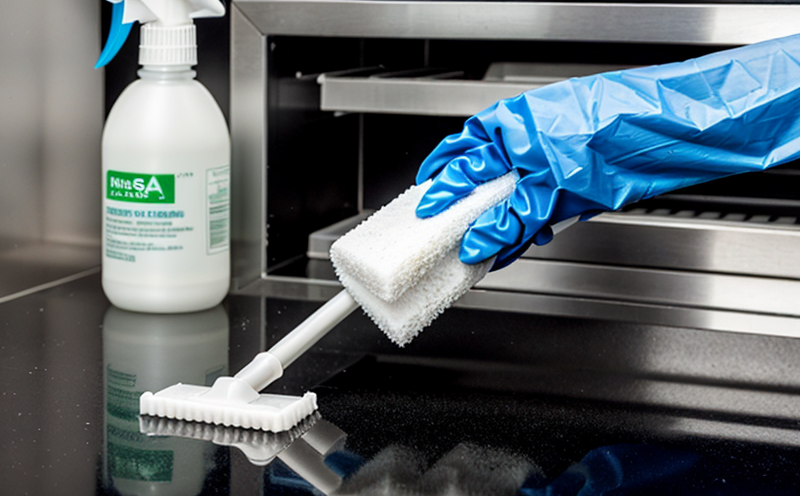ISO 22196 Antibacterial Activity Testing of Cleaning Plastics
The ISO 22196 standard is a globally recognized benchmark for evaluating the antibacterial activity of materials, particularly those used in cleaning applications. This service specifically targets cleaning plastics to assess their effectiveness against targeted bacteria strains. The process involves exposing the plastic specimen to a standardized bacterial challenge and then measuring the reduction in bacterial population post-exposure.
The testing protocol is designed to ensure that the material meets regulatory and consumer safety standards, especially important for products that come into contact with food or hygiene materials. Understanding the antibacterial activity of cleaning plastics helps manufacturers develop safer, more effective products. By adhering to ISO 22196, companies can enhance their product's marketability by demonstrating compliance with international standards.
The testing method typically involves several key steps: preparation of the plastic specimen, inoculation with a specific bacterial strain (such as Escherichia coli or S. aureus), incubation under controlled conditions, and subsequent measurement of bacterial colony counts both before and after exposure to the material.
Compliance with ISO 22196 ensures that cleaning plastics are not only effective in their intended applications but also meet stringent international quality and safety standards. This is crucial for maintaining consumer trust and ensuring product reliability across various industries, including food processing, healthcare, and household goods.
| Bacterial Strains | Incubation Time | Sample Preparation | Data Collection |
|---|---|---|---|
| Escherichia coli, S. aureus | 24 hours at 37°C | Cut to standard size, sanitized, and dried | Bacterial colony counts through microscopy or plate counting |
The testing process is critical in the development of new cleaning products, as it helps identify potential improvements in material composition or surface treatment. It also aids in assessing the longevity and effectiveness of antibacterial properties over time and under various environmental conditions.
By leveraging ISO 22196, companies can ensure their products are not only innovative but also safe and effective. This service is particularly valuable for R&D teams looking to innovate within the cleaning plastics sector or quality managers ensuring product compliance with international standards.
Industry Applications
The ISO 22196 antibacterial activity testing of cleaning plastics has a wide range of applications across various industries, including healthcare, food processing, and household goods. In the healthcare sector, this test ensures that medical equipment and surfaces used in patient care environments are safe from bacterial contamination.
| Industry | Application | Bacterial Strains Used |
|---|---|---|
| Healthcare | Infection control products | E. coli, S. aureus |
| Food Processing | Contamination prevention in packaging and utensils | Listeria monocytogenes, E. coli |
| Household Goods | Cleaning agents and reusable cleaning tools | S. aureus, Pseudomonas aeruginosa |
In the food processing industry, antibacterial plastics can be used in packaging materials to prevent cross-contamination and extend shelf life. In household goods, these plastics are incorporated into cleaning tools like mops and sponges to enhance hygiene.
Testing according to ISO 22196 ensures that these products meet stringent hygiene standards, thereby protecting public health and ensuring consumer trust in the effectiveness of such products.
Why Choose This Test
The ISO 22196 antibacterial activity testing is essential for several reasons. Firstly, it provides a standardized method that ensures consistency across different laboratories and regions, which is crucial for global compliance. Secondly, the test offers valuable insights into the performance of cleaning plastics under controlled conditions, allowing manufacturers to optimize their product development processes.
By conducting this test, companies can demonstrate their commitment to product safety and effectiveness, enhancing their brand reputation and market position. It also helps in identifying potential improvements in material composition or surface treatment, ensuring that products remain effective over time and under various environmental conditions.
The test is particularly beneficial for R&D teams looking to innovate within the cleaning plastics sector. It provides a clear roadmap for developing new materials and treatments that meet both regulatory requirements and consumer expectations. Moreover, it ensures that the products are not only safe but also environmentally friendly, aligning with growing sustainability trends in the industry.
The results of this test can be used to inform marketing strategies, highlighting product features such as durability, hygiene, and environmental friendliness. This information is vital for quality managers ensuring product compliance with international standards, thereby maintaining consumer trust and market leadership.
Customer Impact and Satisfaction
The ISO 22196 antibacterial activity testing has a significant impact on customer satisfaction and loyalty. By ensuring that cleaning plastics meet stringent hygiene standards, companies can build strong brand reputation and trust with their customers. This is particularly important in sectors like healthcare and food processing, where safety and effectiveness are paramount.
Customers expect products to be safe and effective, and compliance with ISO 22196 demonstrates a company's commitment to these values. This not only enhances customer satisfaction but also fosters long-term loyalty. Satisfied customers are more likely to recommend the product to others, thereby expanding market reach and increasing sales.
Moreover, this testing ensures that products meet regulatory requirements, reducing the risk of recalls or legal issues. By adhering to international standards, companies can avoid costly fines and reputational damage, further enhancing customer trust and satisfaction.





